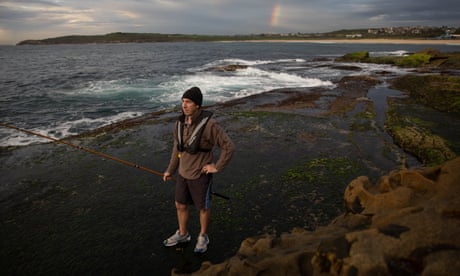- by foxnews
- 23 May 2025
‘That’s why they call it fishing’: the people who risk their lives for a catch
‘That’s why they call it fishing’: the people who risk their lives for a catch
- by theguardian
- 08 May 2022
- in news

In the half light of the approaching sunrise at Maroubra in Sydney's south-east, Joshua Hay clambers over rock ledges, feeling his way to the ocean's edge.
Armed with his 1970s vintage rod, reel and bucket, he's aiming to catch luderick at "the Stake", a popular but dangerous spot among rock fishers.
To get to the Stake "fishos" have to pass a sign reading "three deaths" underneath a skull and crossbones - the tally of drownings in the area.
Rain has been sprinkling down on the coastline overnight, and the rocks are wet and slippery.
As Hay digs around for bits of seaweed - his preferred bait - foamy water laps at his ankles.
"You still get those butterflies," he says with a grin. "That's why they call it fishing, not catching."
The Stake is in the city of Randwick, where there have been 21 rock fishing fatalities since 2001 - making it the most statistically dangerous area for the sport in Australia.
Rock fishing is the second-most common cause of drowning along the New South Wales coastline behind swimming. Despite its dangers, more than 1.2 million Australians go rock fishing every year, including a diverse group of migrants.
Lin Yuan learned the art of rock fishing from "Master Han", an experienced fisher who frequents Bare Island at La Perouse. "My friend sent me a photo of him, and said, 'that guy always catches good fish'," he says.
Nowadays, Yuan, Han and his friend head out when it's still pitch black about 5am, armed with a large net to keep caught fish and squid alive until they assess their haul at the end of the day.
The smaller fish, or the less tasty, are returned to the sea.
Yuan and his mates all wear life jackets and cleats. They have seen the dangers first-hand after watching a fisher get washed away at another La Perouse spot.
"Luckily his friend had a fishing rod, [and] he took off the hooks so they could grab the line and slowly fished him back in," Yuan says. "After he got out, everyone was still fishing, even himself."
Joint research by Surf Life Saving Australia and the University of Melbourne found that a misunderstanding of wave patterns among inexperienced fishers has led to the notion of "freak" wave events.
"Less experienced fishers [surveyed] tended to look closer at the base of where the waves were about to hit," he said. "People had seconds, at best, of warning when a wave was coming, whereas more experienced fishers were already looking offshore."
NSW councils have implemented a range of measures to reduce the risk of rock fishing, including mandating life jackets, increasing signage and running educational workshops.
Randwick was the first council to make lifejackets compulsory in 2016. But a study released by the council the following year found their use had only slightly increased.
Almost half of respondents to a council survey didn't think the use of lifejackets was necessary despite a majority being aware that there was a high death toll in the area.
While Kennedy agreed rock fishing was "inherently dangerous", he said risk would be substantially minimised with greater education and awareness of surroundings.
"You're in a remote environment and that's why people are doing it. You're in nature, and it's recognition [that] nature's boss," he said. "The element of danger is part of the excitement.
Central Coast fisher James Cross says when people tell him rock fishing is dangerous, he replies: "It is, but no more dangerous than swimming."
Cross uses a canister lifejacket that can be inflated if needed, believing that being a strong swimmer, an inflated jacket may hinder his chances of returning to shore.
Cross has been hooked on rock fishing ever since his father-in-law came home with a bag of luderick and drummer for dinner. He has introduced several other people to the sport.
"People have gone, 'where do you keep getting this fish from?' because if I've forgotten a bucket I'll tie a net on the front of the car," he says. "It's a good conversation starter."
Cross gravitated to rock fishing for several reasons: foraging, environmental preservation and the adrenaline rush that comes with an unexpected catch. Then there's the "therapeutic, meditative qualities of it".
"One of the best times is the morning," he says.
Plus, the members of the community have each other's back. That's what Cross loves most.
"It brings out the best in people."
For Hay, fishing isn't just a hobby - it's in his bloodline. "I've fished my whole life, my grandfather fished, my dad fished," he says.
"There've been days with three of us when we've caught 30 fish in three hours, but some of the days I like most, I've gone way out, found a new ledge in the middle of nowhere, no one else is there, and I've caught fish.
"Or days fish are really hard to catch. You try two, three hours, and finally catch one. It's as satisfying as catching 10."
- by foxnews
- descember 09, 2016
United Airlines flight returns to Hawaii after concerning message found on bathroom mirror; FBI investigating
United Airlines Flight 1169 to Los Angeles returned to Hawaii after a "potential security concern" aboard the plane. The FBI and police are investigating.
read more


